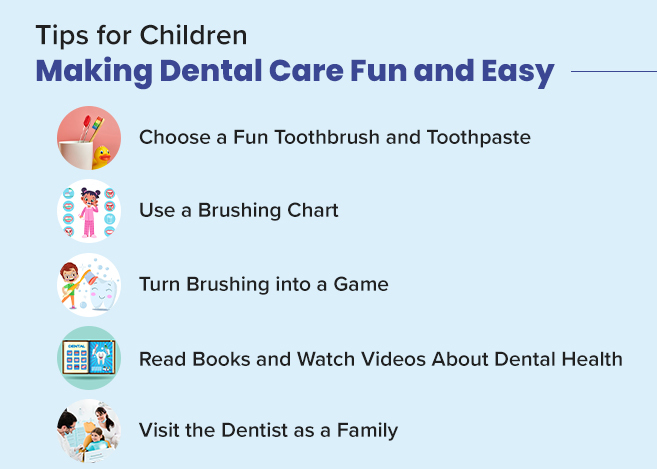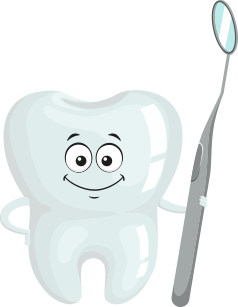Dental Tips for Kids and Parents

Ensuring your child’s teeth stay healthy is more than just a routine—it’s a vital part of nurturing their overall well-being and confidence. Imagine the joy of seeing your child flash a bright, healthy smile that lasts a lifetime! Good oral hygiene habits formed in childhood can pave the way for a lifetime of strong, healthy teeth and gums.
In this blog, we’re sharing essential tips for parents and practical tips for children to help keep those little smiles sparkling. From understanding key oral health facts to making brushing fun, we’ve got you covered. Get in and discover how you can make dental care a positive and integral part of your family’s daily routine!
Why Oral Health is Important for Kids
Oral health is a key part of your child’s overall health. Poor dental hygiene can lead to cavities, gum disease, and other health problems. Did you know that tooth decay is one of the most common chronic diseases in children? It’s important to start good oral care habits early to prevent these issues and promote healthy growth.
Oral Health Facts: What Every Parent Should Know
Tooth Decay is Preventable
Tooth decay is caused by bacteria that produce acid when they come into contact with sugar. This acid can erode tooth enamel and cause cavities. Regular brushing, flossing, and reducing sugar intake can significantly lower the risk of tooth decay.
Baby Teeth Are Important
Although they are temporary, baby teeth play a vital role in your child’s development. They help your child chew and speak properly and also hold space for the permanent teeth. Taking good care of baby teeth is crucial for healthy adult teeth.
Fluoride is Your Friend
Fluoride helps to strengthen tooth enamel and prevent decay. Use fluoride toothpaste and talk to your dentist about other sources of fluoride, such as treatments or fluoridated water, to ensure your child’s teeth are getting the protection they need.
Cavities Are Not Just for Kids
Adults can get cavities, too, especially if they don’t maintain good oral hygiene. It’s important to keep up with dental care as you age to avoid tooth decay and gum disease.
Essential Tips for Parents: Starting Early with Good Habits
Start Brushing Early
It’s never too early to start caring for your child’s teeth. Begin cleaning your baby’s gums with a soft, damp cloth before their teeth come in. Once the first tooth appears, start brushing twice a day using a small, soft-bristled toothbrush and a tiny amount of fluoride toothpaste.
Teach Proper Brushing Techniques
As your child grows, it’s important to teach them how to brush their teeth correctly. Show them how to hold the toothbrush and brush all surfaces of their teeth gently. Use a two-minute timer to ensure they brush long enough. Supervise brushing until they are about 7 or 8 years old to make sure they are doing it properly.
Don’t Forget to Floss
Flossing is just as important as brushing, especially when your child’s teeth start touching each other. Use floss to clean between their teeth daily to remove food particles and plaque that a toothbrush can’t reach. There are kid-friendly flossers available that make the process easier for little hands.
Schedule Regular Dental Visits
Take your child to the dentist by their first birthday, and continue with regular check-ups every six months. Regular visits help prevent dental problems and teach your child that the dentist is a friendly helper who keeps their teeth healthy.
Encourage Healthy Eating Habits
A balanced diet is crucial for healthy teeth. Limit sugary snacks and drinks, which can cause cavities. Instead, encourage your child to eat fruits, vegetables, whole grains, and dairy products that are rich in calcium and other nutrients that promote strong teeth.
Lead by Example
Children often mimic their parents’ habits. Show them that you take your own oral health seriously by brushing and flossing regularly and visiting the dentist. When they see you practising good habits, they’re more likely to follow suit.
Tips for Children: Making Dental Care Fun and Easy

Choose a Fun Toothbrush and Toothpaste
Let your child pick out a toothbrush and toothpaste with their favourite characters or in fun colours. This can make brushing more enjoyable and something they look forward to.
Use a Brushing Chart
Create a brushing chart with stickers or check marks to track daily brushing and flossing. This visual reminder can help children remember to brush and make the process more rewarding.
Turn Brushing into a Game
Make brushing fun by turning it into a game. Use apps or songs to time the two-minute brushing routine, and reward your child for good brushing habits with a small treat or a fun activity.
Read Books and Watch Videos About Dental Health
There are many children’s books and videos that explain the importance of dental health in a fun and engaging way. These resources can help your child understand why it’s important to take care of their teeth.
Visit the Dentist as a Family
Turn dentist visits into a family activity. When your child sees that everyone goes to the dentist, it normalises the experience and makes it less scary.
Conclusion
Good dental habits are essential for children’s overall health and well-being. By starting early and making dental care a fun and regular part of their routine, you can help your child develop healthy habits that will last a lifetime. Remember, regular brushing, flossing, and dental visits, combined with healthy eating habits, are the keys to maintaining a healthy smile.
By following these essential tips for parents and tips for children, you can ensure that your family maintains excellent oral health. Keep these oral health facts in mind, and make dental care a priority in your household. And if you are looking for the best paediatric dentist in Chennai, visit Radiant Dental Care. We are well-versed in handling any kind of oral health concerns with professionalism. Book an appointment to know more.
Frequently Asked Questions
When should I start brushing my baby’s teeth?
A: Start cleaning your baby’s gums with a damp cloth before their teeth come in. Begin brushing with a soft-bristled toothbrush and a tiny amount of fluoride toothpaste as soon as the first tooth appears.
How often should my child visit the dentist?
A: It’s recommended that your child be taken to the dentist by their first birthday and continue with regular check-ups every six months.
What should I do if my child is scared of the dentist?
A: Make dentist visits a family activity, use positive language, and introduce your child to the dentist early to make the experience less intimidating.
Is it okay for my child to use fluoride toothpaste?
A: Yes, fluoride toothpaste is safe and helps prevent cavities. Use a small amount for young children and supervise brushing to ensure they do not swallow it.
How can I make brushing more fun for my child?
A: Use a fun toothbrush and brushing charts, and turn brushing into a game with songs or apps to make it an enjoyable part of their routine.

 +91 9513446186
+91 9513446186
